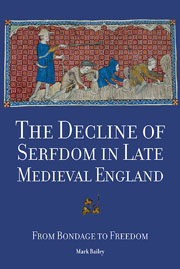Book contents
- Frontmatter
- Contents
- List of Maps
- List of Graphs
- List of Tables
- Acknowledgements
- Abbreviations
- Part I The Decline of Serfdom: Questions and Approaches
- 1 The Decline of Serfdom and its Historical Significance
- 2 The Chronology of Decline: Villein Tenures
- 3 The Chronology of Decline: Servile Incidents
- 4 The Causes of Decline
- Part II Case Studies
- Part III Conclusions
- Appendix: List of original sources used in this study
- Chronology
- Bibliography
- Index
2 - The Chronology of Decline: Villein Tenures
from Part I - The Decline of Serfdom: Questions and Approaches
Published online by Cambridge University Press: 05 March 2014
- Frontmatter
- Contents
- List of Maps
- List of Graphs
- List of Tables
- Acknowledgements
- Abbreviations
- Part I The Decline of Serfdom: Questions and Approaches
- 1 The Decline of Serfdom and its Historical Significance
- 2 The Chronology of Decline: Villein Tenures
- 3 The Chronology of Decline: Servile Incidents
- 4 The Causes of Decline
- Part II Case Studies
- Part III Conclusions
- Appendix: List of original sources used in this study
- Chronology
- Bibliography
- Index
Summary
Villeinage and serfdom in England in c.1300
Between c.1160 and c.1220 the development of the common law in England established that the title to land held on free tenure could be defended in the royal courts. Land held on tenures which did not have access to the (royal) courts of common law, and whose title was therefore entirely dependent upon the gift or the will of the manorial lord, were defined as unfree (also ‘customary’ or ‘villein’). The villein, who held ‘unfree’ land, did possess a legal right to pursue other actions, such as debt and trespass, in the royal courts, and, in theory, these courts had to the power to protect the villein against assault and maltreatment. However, few villeins were ever allowed to bring such cases before the royal courts, although Hyams suggests that they posed interesting and complex legal questions when they did. Hence villeins could neither defend their title to villein tenure, nor pursue proprietary actions against their lords, under the common law. Instead, all issues relating to the title of villein tenure, or to the status of the villein, could be defended only in the private court of the relevant lord, and therefore, in theory, both villein land and the villein were vulnerable to forfeiture at the arbitrary will of their lord.
It was not just land that was categorized as unfree, but people too. Thirteenth-century lawyers argued that a person was born either free or servile, based upon the principle that genealogy determined legal status: legitimate offspring acquired the status of the father, whereas the status of bastards was uncertain and thus presumed to be free.
- Type
- Chapter
- Information
- The Decline of Serfdom in Late Medieval EnglandFrom Bondage to Freedom, pp. 16 - 36Publisher: Boydell & BrewerPrint publication year: 2014

